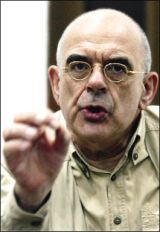Darfur combatants still ignore Sudan peace pacts
By Evelyn Leopold
UNITED NATIONS, Jan 11 (Reuters) – Fighting is spreading in Sudan’s Darfur region and may intensify in the short-run despite a landmark peace agreement between Khartoum and rebels in the south, a senior U.N. official said on Tuesday.

|
|
Jan Pronk, the special U.N. envoy for Sudan. |
Jan Pronk, the special U.N. envoy for Sudan, told the U.N. Security Council arms were flooding into the region, violence was spreading beyond camps for the homeless, banditry was increasing and rebel groups were launching attacks in the area of oil facilities.
“We may move into a period of intense violence unless swift action is taken,” Pronk said. “I do not exclude the possibility that the signature of the (north-south) agreement will be followed in the short term by an intensification of violence in and around Darfur.”
The Sudanese government, he said, may be tempted to think that the world would not put at risk the north-south agreement that ended two decades of fighting by taking action in Darfur. And Darfur rebel movements appear to believe that military gains are the way to be taken seriously.
The only bulwark against a wider war appears to be the African Union, which has promised more than 3,000 troops and monitors but has not been able to put more than a third of them in the field and needs outside help.
The council meeting, scheduled for Tuesday morning, was delayed for more than five hours, because France insisted an English-language report on Darfur be translated into French first, diplomats said.
About 1.7 million people are homeless and some 70,000 are estimated to have died in Darfur. The crisis was sparked in February 2003 when pastoral rebel groups took up arms against the government in a struggle over power and scarce resources.
Khartoum retaliated by arming nomad militia, accused of conducting a campaign of murder, rape and arson.
POWER AND WEALTH
Pronk suggested the talks on Darfur, held in Abuja, Nigeria, should concentrate on future political arrangements, including sharing power and wealth. Security and humanitarian access should be excluded from Abuja and negotiated by a separate AU cease-fire commission and others in Khartoum.
The talks also needed to include:
— The government should stop military flights, unless the AU clears them, as well as “road-clearing operations” that have restrained movement and destroyed homes. The rebels should stop attacking the police and infrastructure.
— Both sides should withdraw between well-defined lines, under protection of the AU troops.
— Basic food and other needs of the fighters should be met to diminish “the urge to steal, loot and kill.” The government has to disarm its militia and rebels have to stop disrupting seasonal movements of nomads and their cattle.
— The government should arrest militiamen responsible of murder, rape and pillaging and not wait until a U.N. commission reports later this month on whether genocide had taken place.
The Security Council has threatened sanctions against human rights violators but Russia and China oppose the punitive measures the United States wants. The Bush administration refuses to allow any referrals for prosecution to the International Criminal Court, whose existence it opposes.
Pronk also proposed a national conference that would include tribal leaders, many of whom are not controlled by the government or rebels.
“The second stage of the war between North and South Sudan lasted two decades. Why should we allow the war in Darfur to last more than two years?” Pronk said.
